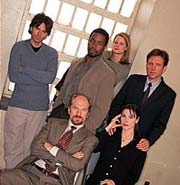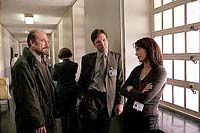
Every once in a while, a talented person takes a threadbare television formula, turns it inside out, and finds something extraordinary in the lining. Peter Berg has done this with Wonderland, the E.R.- like hospital drama that makes its debut opposite that show on ABC next Thursday night, March 30, at 10 p.m. Eastern time. (Berg is an actor turned writer, director, and producer who played a doctor on Chicago Hope.) Concept-wise, the twist is minor--a switch in setting, from a public general hospital modeled on Cook County Hospital in Chicago to a public mental hospital modeled on New York City's Bellevue. But the ramifications are enormous.
To begin with, there's the messiness of it all. Emotional disturbance defies easy television-style closure. The people who show up in the admitting rooms of public mental hospitals are people for whom happy endings are no longer imaginable. Having lost spouses and jobs and sanity, or never having had any of these things in the first place, they're living lives of unthinkable complexity. And unlike emergency-room doctors, forensic psychiatrists can't cut, snip, or even medicate their patients' pain away. No one gets better by the end of the hour. The human detritus keeps pouring in.
But so do the dramatic possibilities. Dealing with this much raw suffering puts doctors under extraordinary strain, so naturally they sprout personal problems. The people they treat are going through similar stress and trouble, just on a vastly larger scale. Since the doctors and patients have something in common, the writers can establish a powerful rapport not just among the physicians, as on most hospital dramas, but between them and those they treat. The one-on-one encounters between the psychiatrists and their charges unfold like musical duets running up and down the scales--they're variations on emotional themes--and a rich sense of the main characters' inner lives accrues scene by scene, show by show, with the slow, serial development that only television allows. A handsome young doctor grappling with his fear of emotional involvement conducts several intake interviews in which nightmarish relationship stories emerge. One man has tried to kill himself because his wife just left him. A husband and wife married for 50 years have begun to drive each other, literally, mad. We begin to understand why the doctor is afraid.
Have I mentioned that the actors are good? They are, especially the two lead male psychiatrists, the understated Martin Donovan--the star of many Hal Hartley movies and also a character in the recent Portrait of a Lady--and Ted Levine, who played the killer in The Silence of the Lambs. Levine brings the same kind of scary concentration to his portrayal of Dr. Robert Banger, a man who's overinvolved with, and almost too compassionate toward, his violent patients, but who is himself weirdly bottled up, with several flavors of impatience and rage waiting to erupt.

Another reason to watch this show is that it's important. I know that sounds portentous and implies that the series is secretly boring. It isn't, though, because it does something rare. How long since you saw a network television series accord the mentally ill--including those who have committed heinous criminal acts--anything like dignity? How long since a network television series treated anybody on the wrong side of the law with respect? The main story line in the first two episodes of Wonderland deals with a psychotic who's a barely disguised version of Andrew Goldstein, the young New Yorker who, having been unable to obtain care and medication from state mental hospitals, lapsed into schizophrenia and pushed a young woman off a subway platform into an oncoming train. In the somewhat more overwrought Wonderland version of events, he's a graduate of Columbia University with a classics degree who shoots two cops and kills three civilians in Times Square, then in a struggle at the hospital plunges a needle into the belly of a pregnant psychiatrist, who happens to be the admitting doctor who turned him away four days earlier.
Goldstein was convicted of murder last week, despite his plea of not guilty by reason of insanity. The Wonderland writers would probably take issue with that outcome, but in their adaptation of the story, they stay focused on the difficult questions: the unbearable amount of damage the man wreaks, the failure of the mental-health system to stop it, the terrible sadness of a person driven to do things he doesn't understand by voices in his head. By reminding us of the humanity of the violently ill, Berg has found a way to sneak onto television a political agenda infrequently furthered by the popular media, because it depends on the ability to get beyond stereotypes. I hope Berg can resist the pressure of time and ratings to cheapen his vision. Call me crazy, but I think shows like this are our salvation.
Stills from Wonderland copyright (c)2000/Bob D'Amico and copyright (c)2000/Eric Liebowitz.